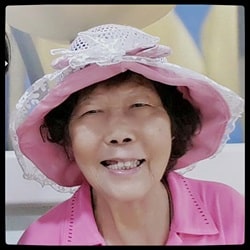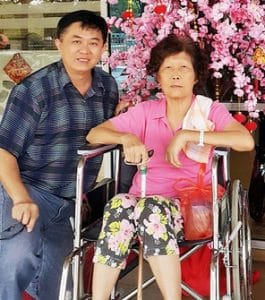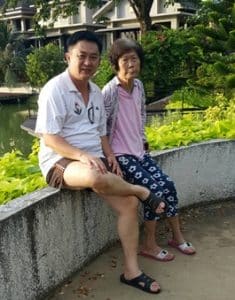In the early 1970s, in the small town of Jenjarom in Banting, life was simple yet full of quiet resilience.

I was just a young boy, about five or six years old, and my days were defined by one constant: following my mother to the rubber kebun( small plantation of 10 acres or less). Every morning, before the first light of dawn broke over the horizon, my mother would prepare herself for the long day ahead. Her movements were gentle but purposeful, ensuring not to wake my younger sibling.
Once ready, she would carefully lift me into the basket attached to the front of her bicycle. I became her pillion front rider, nestled comfortably among the soft, worn cloth she used to cushion the basket. I loved being in that spot, cradled by the rhythmic motion of the bicycle, the morning cold breeze and the steady pulse of my mother’s determination. The air was cool, tinged with the smell of damp earth and the faint scent of rubber trees waiting to be tapped. My mother’s legs moved with a tireless energy as she cycled through the quiet streets, heading toward the plantation that lay just beyond the edge of the town.
The ride to the kebun was serene, with the world still wrapped in a blanket of dawn. The roads to Jalan Banting were empty with a few kereta or vehicles, save for a few early risers, and the only sounds were the creaking of the bicycle’s wheels and the occasional chirp of crickets fading into the morning light. I would often rest my head against the basket’s edge, lulled by the gentle swaying of the bicycle, feeling safe and content. My mother’s presence was a constant reassurance, her strong hands guiding us both towards the day’s work.
As we approached the kebun, the scene would change. The air grew thicker with humidity, and the shadows of the tall rubber trees stretched out like sentinels in the early morning light. We weren’t alone in our journey. All around us, other rubber tappers and other smallholders made their way to the fields, forming a silent procession of bicycles, each one carrying a story like ours. Together, they were the backbone of our rural Malaysian agricultural economy, though they never sought recognition or praise.1
My mother’s work began as soon as we arrived. She would park her bicycle under the shade of a rubber tree, and after helping me down from the basket, she would set about her task with a quiet efficiency. The rubber tapping knife or pisau toreh in her hand gleamed in the soft light and with each measured cut, the latex would begin to flow, collecting in the small latex cups or cawan placed at the base of each tree. I would often sit nearby, watching her with wide eyes, admiring her skill and the grace with which she worked.
Despite the swarms of mosquitoes that descended upon us as the hours passed, she never faltered. The heat would grow intense as the sun climbed higher, but my mother kept going, driven by the knowledge that each drop of latex was crucial to our survival and well-being.
As she worked, I realised that these daily collected latex, though small and seemingly insignificant on their own, were part of something much larger. These tiny drops, gathered by my mother and countless others like her, flowed together into the broader stream of Malaysia’s rubber export – a vital Malaysian commodity then that connected our small town to the nation and to the world.
I would try to help in my small way – simply staying close – providing her with company during those long hours. My mother’s patience and dedication were not just shaping the landscape of our economy, but also nurturing me and the family, instilling the values of hard work, perseverance and the importance of family. Her sacrifices, both seen and unseen, formed the foundation upon which I would grow, guiding me to become a better person, shaped by the love and resilience she showed every day.
By mid-morning, the kebun was a hive of activity. The sounds of tapping filled the air, mingling with the rustling of leaves and the quick chats with neighbouring tappers. These were ordinary people, like my mother, who worked tirelessly day after day, contributing in their own way to the growth and prosperity of our nation. They may not have been celebrated in history books, but their efforts were the lifeblood of our community, ensuring that families like ours could survive and thrive.
When the day’s work was done, my mother would gather the latex, secure it to the back of her bicycle, and lift me once more into the basket at the front. The ride home was always quieter, the morning’s energy replaced by the exhaustion of a day’s hard labour. Yet there was a sense of satisfaction in the air, a feeling that today’s work had been good, that it had brought us one step closer to a better life.
As we cycled back through the town, the sun now high in the sky, I would often fall asleep, cradled by the warmth of the day and the steady motion of the bicycle. My mother’s strength, both physical and emotional carried us through those days, ensuring that we had enough to eat, enough to get by.

Today, at 82 years old, my mother is frail and battles the fog of dementia. It’s heartbreaking to see the woman who once cycled tirelessly to the rubber plantation, who guided us with firm hands and a loving heart, now weakened by age and illness. That’s is the journey of life. Yet, in my memories, she remains that strong, determined figure who did everything she could to provide for us.
Looking back, I realise just how much I owe to my mother – and to all the rubber tappers and smallholders like her. They were the unsung heroes of our rural agri-communities, working quietly yet powerfully to build the foundation of our nation.
At a time when Malaysia was still finding its footing post-Merdeka, it was these common Malaysians who played a small but meaningful part in nation-building. Their contributions, though often overlooked, were vital.

Today, the 31st of August, as we celebrate our nation’s 67th Kemerdekaan or independence, I find myself reflecting on those early years and the sacrifices made by people like my mother. She was just one of many, yet her story is emblematic of the countless others who gave their all for the future of their families and unknowingly to their country. I am deeply indebted to her, not just for the life she provided but for the values of hard work, resilience, and love that she instilled in me
Let us also remember and cherish those common Malaysians who, in their own small but significant ways, helped shape the nation we are proud to call home. Lest we forget our roots, we must honour those who came before us, whose lives and labours laid the groundwork for the Malaysia we celebrate today.
We salute them, and we honour their legacy. Lest we forget. Let us not fail their sacrifices and dreams for their families and our nation.
Joseph Tek Choon Yee is a distinguished leader in the palm oil industry with over 30 years of experience.
His career includes corporate roles such as CEO and Managing Director of a publicly listed company
and Chief Executive of the Malaysian Palm Oil Association (MPOA). Joseph holds a First-Class Honours
Bachelor’s degree in Botany from the National University of Malaysia, an MPhil in Plant Breeding from
Cambridge University, and has completed the ASEAN Senior Management Development Programme
at Harvard Business School. His educational background, combined with his extensive industry
experience, enables him to blend technical expertise with strategic vision and passion. Guided by his
motto, “Aspire to inspire before expire,” Joseph is dedicated to advancing leadership and innovation in
his field. He opted for an early retirement and now lives in Kota Kinabalu, Sabah. He is involved with
youth empowerment through TVET especially for marginalised youths in Borneo.
Footnotes
- Rubber accounted for 60% of the export of Malaysia. Along with tin, rubber industry was the British Empire’s largest hard currency earner after World War II. Most of the export earnings were repatriated to London

Beautifully written. Inspiring.
Very impressive story Mr. Tek! Your mother is a real and modest hero!
Hi Manash. TQVM for your kind words. I am really touched that my writeup about my mum resonated with many in Malaysia and elsewhere who may had similar experiences. If not, they have been touched about the hardships of our parents in the past. It is a reminder of how shared stories can bring us closer together. Wishing blessings and love to all who have journeyed through similar paths,
Beautiful story Joe! Salute and regards to your mum 🙏🏻